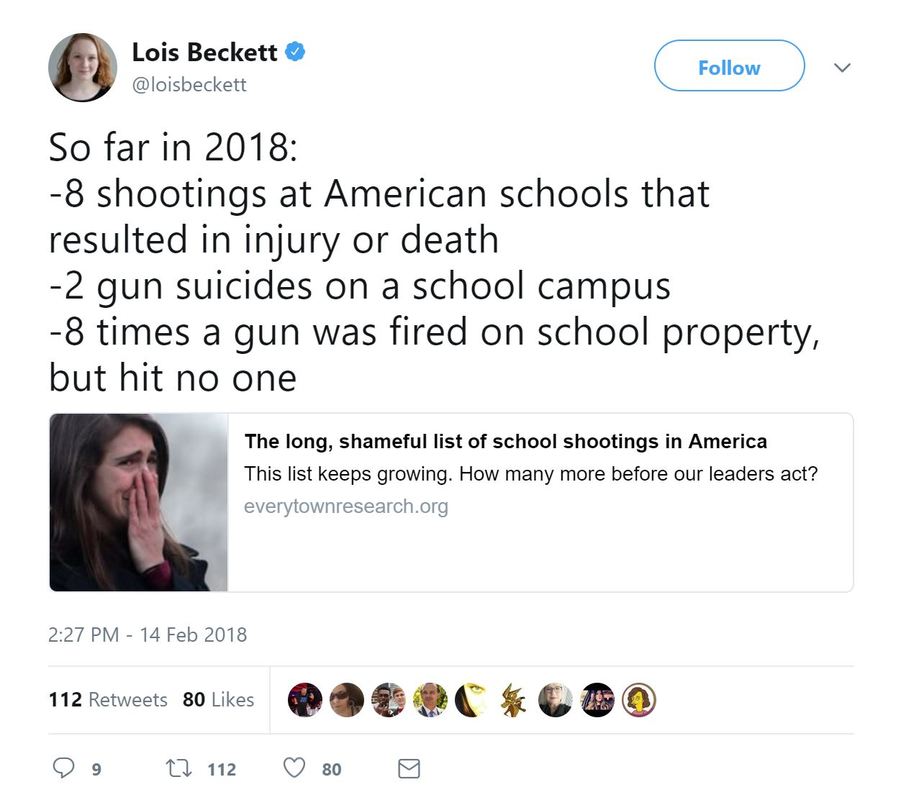|
Today marks the 18th time this year that a shooting has occurred in a school in the United States. The shooting in Florida has resulted in at least 17 dead and many more injured at the time of writing. <Source CNN>
There are a number of cultural and historical objections to gun control in the United States, but there has not been an enemy on the doorstep of the worlds largest economy since the war for independence in 1773. In 1861 they endured a Civil War, that however, was not one involving invasion or international threat. Unlike middle eastern states who have had war raging around them for decades, the threat of war on US soil has been virtually non-existent for over 150 years (Bay Of Pigs notwithstanding). At this point, logically, the argument for gun control is surely strong enough to warrant at least some action being taken to mitigate the risk of assault rifles and other high powered, high capacity weapons being easily available across the whole country to all and sundry. This, however, isn’t an argument for gun control, or a ‘prayers for the victims’ post. It is simply posing a question. There are myriad social problems, inequalities and difficulties faced by numerous communities in democracies across the globe. Why doesn’t the murder of innocents and children shift the needle for one solitary issue (The issue – What should we do about constant shootings)? How can we formulate plans to instigate change on far more complex, nuanced, subtle and less in-your-face issues? How do we improve education standards across the board, across all ages, delivery methods, subjects and outcomes? How can we level the playing field of opportunity for minorities, women, people with disabilities and low Socio-economic groups? How can we address the growing wealth inequality, which is caused by dozens of factors, when a world leading economy can’t agree on how to mitigate a gun violence problem that is so glaring? The issue here is not only gun violence. It is the lack of a coherent and sensible pathway to address and manage blatant problems in our societies today. How do we establish evidence and fact-based responses to problems, free from hyperbole and emotive over-reaction? How do we remove the bureaucratic dilution of efficacy, putting in place plans that are effective and simple, rather than ineffective and complicated? How can Australians, and other democratic countries around the world lead the way on sensible decision making and character-led leadership? The increasing partisanship and divisive, emotion driven politics of the day are driving us further away from environments in which positive, inclusive and long term-change are possible. While in Australia we very fortunately don’t have the problem with gun violence that our Allies in the US do, we can still lead by example by working on solutions rather than name calling. Working on bringing communities together, rather than wedging them apart for votes. We can work on being more inclusive and providing more opportunity, rather than jealously guarding our own privilege while demanding that others remain happy with their lesser lot. It starts with electing leaders that genuinely have the best interest of people at heart. Not only big business, not re-election, not avoiding internal party factional disputes. Leaders that walk the walk and don’t just evasively talk, redirect and finger point. Make no mistake, change is difficult. If murdered children can’t create change, what will? At the Just Be Nice Project, we are committed to developing Character-Led individuals and leaders, we would love to hear your thoughts. |
Just Be NiceA collection of articles relevant to pursuing the effective execution of altruism in the search for equality of opportunity. Archives
February 2020
Topics
All
|

 RSS Feed
RSS Feed